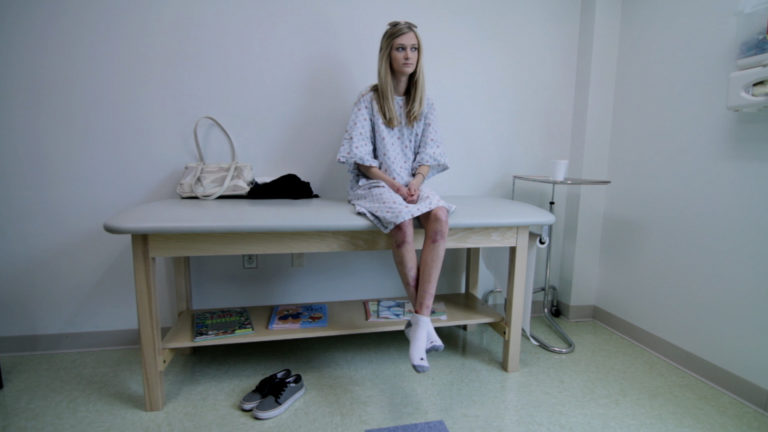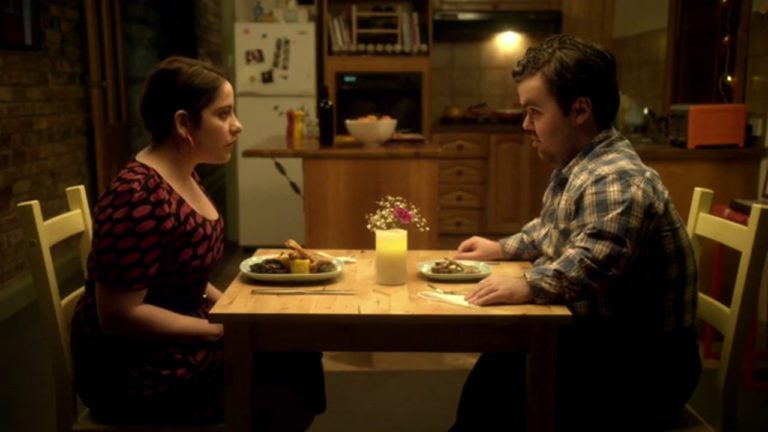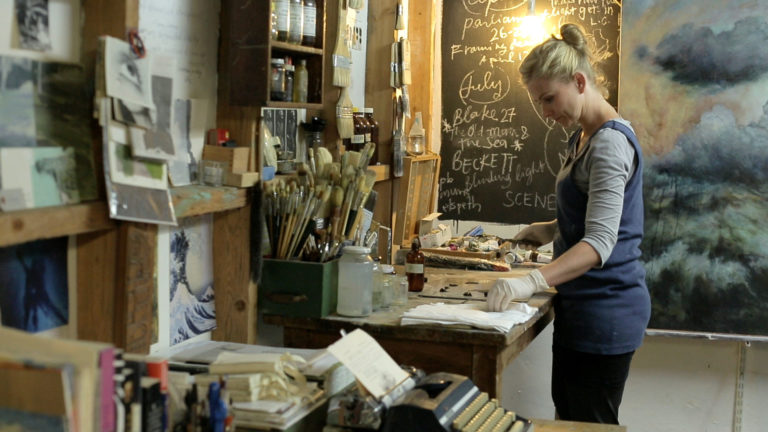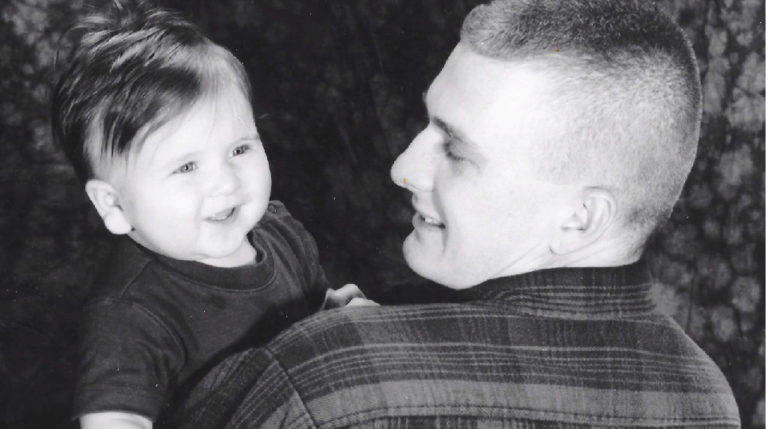At first glance, it is not obvious that Abigail Evans lives with a life-threatening skin disease. She is a typical teenager: moody, rebellious, irreverent, and is also strikingly beautiful. But her life is the antithesis of normal. Abbie grew up in hospitals, cared for by her protective mother and father. She then came into her own in honky tonks, selling merchandise for her dad’s band. But just like any other 18 year-old, Abbie yearns for a life of her own. Butterfly Girl charts Abbie’s journey towards a new understanding of how she must balance her past with her future, her parents with her independence, and her disease with her desires. But what price must she pay for that freedom?
Summary info for schedule – will be hidden on film page
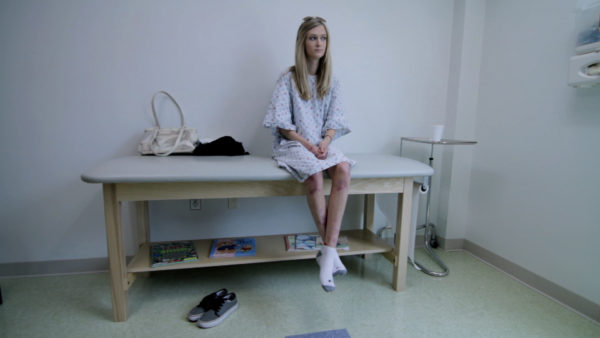
Butterfly Girl
78-minutes
At first glance, it is not obvious that Abbie Evans lives with a life-threatening skin disease. She is a typical teenager: moody, rebellious, irreverent, and is also strikingly beautiful. But her life is the antithesis of normal.
Screening day / time
Check Back Soon
Butterfly Girl
Butterfly Girl
Filmmaker Notes:
1. Tell us about the origins of Butterfly Girl – what attracted you to the story / concept?
The Butterfly Girl editor/producer, Jess Miller, and I were at SXSW 2012 and at the time we were both working in television. After a week of watching films and being challenged as both creatives and individuals, we made a decision that drastically changed both of our lives- we decided we wanted to take a stab at making our own documentary. We began by talking about the general feel/style of what we wanted to do and knew we wanted something with a lot of natural juxtaposition that was character and narrative driven- and when we started throwing around potential subjects, Jess mentioned Abbie, who we had met about a year earlier at one of her dad’s shows, and immediately we knew that we had to tell her story. From there everything just organically unfolded.
2. How would you describe the tone of the film?
Intimate. When you watch Butterfly Girl you feel that you are right there with Abbie during some of her most private moments. You get to see her alone, see her in pain, see her laugh, cry, you get to go on this journey with a young girl who is real- and in that way it’s so much like a narrative, but you’re watching a real person’s story.
3. Who is Abigail Evans and where does she find herself in life at the start of the story?
Abigail is like no one else I have ever met, which is why she is the perfect subject. She’s layered, complicated, and so full of life and energy despite everything she is up against. At the beginning of the film she’s at this point in her life where she is no longer a child, but not yet an adult, which I think is something everyone can relate to, what that feels like. As the story unfolds you watch Abbie grapple with growing up and trying to navigate how she can enter the world without her parents, but still maintain her health.
4. Set up the dynamic between Abigail and her parents.
Abbie has very close relationships with both her mom and dad, despite the fact that they divorced when she was young. Her parents are so protective of her, and would give her the world if they could. They want nothing more than for Abbie to soak in as much life as she can, and because of that Abbie is the kind of person that does whatever she wants, no matter what the consequences are. Her dad is tougher, I think it’s really important to him that Abbie doesn’t get special treatment just because of her disease, he is a loving father and at his shows Abbie is his side kick. He wants her to have something as close to normalcy as possible. Then on the other hand, Abbie’s mom is very motherly, she worries a lot about whether or not Abbie is being careful and taking care of herself, she gives Abbie the soft love. In Abbie’s own words: ‘it’s the best of both worlds’. And it’s that parental balance that has made her who she is. Abbie is soft but so tough all at the same time.
5. Talk about working with Abigail. What about her was so special?
During production it was just me, the DP (Matt), and Abbie. The three of us became so close and spent almost every day together for over four months, and I would spend days with her even if we weren’t filming. Through creating an intimate production environment we were able to get the intimate film we have…and Abbie let us into her life like that- she even gave me keys to both of her homes. I can’t think of many people that would open up the way she has, and trust me like she did. Abbie and I worked together- which is a different way to make a documentary. She did not like being told what to do or being interviewed, instead she was always so curious about what we were doing, how the cameras worked, why I needed to film certain things, why I needed to ask her questions….so anytime I would interview her she would turn around and interview me. It was a deal we had. But Abbie loved being in the spotlight and often referred to us as ‘her camera crew’. So once Abbie understood everything she would let us do whatever we needed to. But things had to be on her terms and it was important that she was involved in decisions, after all, the film is about her life. Butterfly Girl is what it is because of Abbie. And not just because it’s about her, but because she took an active interest in how we were making it and became involved and even produced a few shoots! She is a very very special person and unlike anyone I have ever filmed or met before.
6. What films have inspired you as a filmmaker as you dug into directing Butterfly Girl?
I’ve always been interested in playing with documentary structure and format, as has our editor, Jess Miller. We knew we didn’t want any talking heads or lower thirds in the film, so we watched a lot of narratives and a lot of non-traditional documentaries. Specifically, Sofia Coppola and Spike Jonze films, and we paid close attention to the way they use music. We wanted the music to support the narrative and drive the through lines. I think without the music, Butterfly Girl would not be the same film. I also was really inspired by Last Train Home, which I think is an amazing film that’s small in focus and extremely intimate but so epic and also deals with coming of age in a world where the odds are stacked against you. Another one of my favorite documentaries is Hell and Back Again, which also takes you on a very intimate journey. I guess ultimately, that’s where I want to be as a filmmaker- telling intimate stories that somehow relate to your life.
7. What can audiences expect from this film?
You will fall in love with Abbie and by the end of the film, you will feel as though you’ve known her all your life. She will inspire you to be a better person and live your life to the fullest- which is such a cliche thing to say, and we all hear it all the time, but there is something about her story that makes you realize what that phrase actually means and how true it is. Abbie is fearless, don’t we all wish we were fearless? Maybe after watching this film you will be a little stronger than you were at the beginning.
8. Why was Austin, TX such an important part of the film?
The film is set in this world of honky tonks and hospitals with Austin as the backdrop. It’s Abbie’s stomping ground, her town. She’s from Beaumont, in Southeast Texas, but moved to Austin at 15, so it’s where she came into her own as a sweet,sassy teenager that can get into any bar she wants and knows someone everywhere she goes. In so many ways Butterfly Girl is a story that represents Austin- it has music, it has heart, and it has a youthful edge- which is exactly what Austin is, but plus tacos and BBQ.
Film details
Year(s) screened
- 2014
